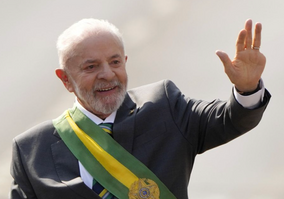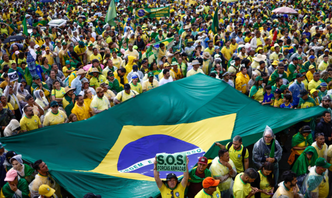History
Two to five million Indigenous people occupied what is now Brazil. After gaining the right to Brazil, the Portuguese sent Pedro Alvares Cabral, a Portuguese admiral to claim the land. When Cabral and his men arrived in Brazil around the year 1500, they encountered many of those Indigenous groups. The Portuguese were quick to start settling and changing the rich culture that the Natives had already established. Slaves were brought in from Africa, new cities were founded, buisnesses were started, and Portuguese missionaries started converting the Indigenous people. Portugal ruled Brazil for many years to come. Napoleon’s invasion of Portugal caused the Portuguese royal family to retreat to Brazil. In 1821the king returned to Portugal leaving his son Pedro in charge. Not even a year later, Pedro declared Brazil independent and crowned himself emperor. After 350 years, slavery was finally abolished in 1888. Following WWI Brazil continued suffering from economic problems that had been an issue for about fifty years. This led to a coup which prompted Getúlio Vargas’s rise to power. Following an uprising against the government in 1935, Vargas created a dictatorship in Brazil which lasted ten years until he resigned. Though he was reelected in 1950, he committed suicide in 1954 due to growing political unrest. By the late 20th century Brazil had reverted to a full democracy. In the early 2000s, the economy started to improve slowly and Brazil even earned a spot on the United National Security Council under the rule of Lula da Sliva. In 2018 Bolsonaro was elected president. Bolsonaro remained popular until the outbreak of COVID-19 when he took a very anti-lockdown and vaccine stance. This ended in Brazil taking the 2nd spot for most deaths due to COVID. At the next election, da Silva won for a second time and is the current serving president of Brazil. A week later, Bolsonaro's supporters stormed government offices and structures causing extreme damage.
Demographics
The population of Brazil is split into many ethnic groups. One of the largest ethnic groups is European descent, accounting for almost one-half of the entire population. However, the largest group is people of mixed ethnic backgrounds. Two-fifths of the total population are mulattoes meaning they are of African and European descent and Mestizos meaning they are of European and Indigenous descent. A very small percentage of Brazilians come from African or part African descent and an even smaller percentage of the population have Asian ancestry. The remaining people are of Indigenous descent. Even though it is the smallest demographic group, almost one-third of Brazilians have some native ancestry. While looking at the demographics of Brazil, it’s interesting to look at the drastic difference between the European and Indigenous percentages. There could be many reasons why Brazilians of European descent make up so much more of the population than those of Indigenous descent. One of the main reasons is the colonization by Portugal which brought many Europeans to Brazil but also brought many diseases that reduced the Indigenous population. Overall, Brazil is a very diverse country.
Work cited
Encyclopedia Britannica. “Encyclopedia Britannica | Britannica.” Encyclopedia Britannica, 2025, www.britannica.com/. Accessed 19 Feb. 2025.
“Infobase Learning - Login.” Infobaselearning.com, 2025, online.infobaselearning.com/login.aspx?app=WE39&returnUrl=/wgco/Default.aspx. Accessed 19 Feb. 2025.
“Lula Da Silva Is in the ICU after a Head Operation.” Argia.eus, 2024, www.argia.eus/en/albistea/lula-da-silva-ziun-dago-buru-ebakuntza-bat-egin-ostean/inprimatu. Accessed 13 Mar. 2025.
News, PBS. “Bolsonaro Supporters Protest against Brazil’s Presidential Election Results.” PBS News, 15 Nov. 2022, www.pbs.org/newshour/world/bolsonaro-supporters-protest-against-brazils-presidential-election-results. Accessed 13 Mar. 2025.
Tutton, Mark. “Why Brazil’s Jair Bolsonaro Has Environmentalists Worried for the Amazon.” CNN, 5 Jan. 2019, www.cnn.com/2019/01/05/americas/bolsonaro-amazon-global-warming/index.html. Accessed 13 Mar. 2025.


